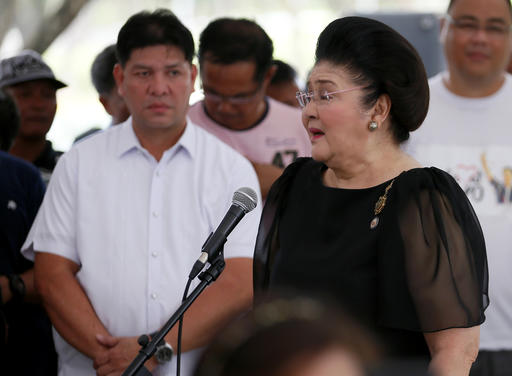
Imelda Marcos, widow of the late Philippine dictator Ferdinand Marcos. AP Photo
Former First Lady Imelda Marcos has sought her acquittal for graft on the grounds that her then-unconstitutional transactions with foundations in Switzerland are no longer so under the 1987 Constitution.
She also argued before the Sandiganbayan that her “mere participation” in the Swiss foundations was not in itself a violation of the graft law, because they were not connected to any official government transaction.
Ombusman prosecutors had charged Imelda with graft because her transactions violated the 1973 Constitution for taking place while she was serving as Batasang Pambansa member from 1978 to 1984 and minister of human settlements from 1976 to 1986.
Imelda was thus charged from 1991 to 1995 with 10 counts of violating Section 3(h) of the Anti-Graft and Corrupt Practices Act, which prohibits public officials from taking part in transactions involving the government or otherwise prohibited by the Constitution.
In response, Imelda said in a 12-page defense memorandum on Tuesday that the 1973 Constitution’s prohibition was deleted from the 1987 Constitution, the charter enshrined after the dictatorship of her husband President Ferdinand Marcos.
“Hence the prohibition against intervention in matters before government offices no longer applies to cabinet members,” read the memorandum prepared by lawyer Robert A.C. Sison.
“The result is that it is no longer a crime under Section 3(h) of [the graft law] for a cabinet member to intervene in any matter before a government office for his pecuniary benefit,” the memorandum added.
Management of foundations not illegal?
Imelda also argued the prosecution failed to connect the foundations to any transaction involving a government agency or corporation during her term as a public official.
“True, participating in the management of a business is proscribed by the Constitution but by itself such participation is not punishable…,” the memorandum read. “There must be a showing of a prohibited pecuniary or financial interest in a contract with, or a privilege or franchise granted by the government.”
The Swiss foundations and bank accounts were used to facilitate millions of dollars in transactions that far exceed the Marcos spouses’ declared lawful income of only $957,487.75 from 1965 to 1985.
Prosecutors said the Marcos spouses even opened accounts under the names “William Saunders” and “Jane Ryan” to fund the foundations, where they named themselves or their children as primary beneficiaries.
But, Imelda also argued “the mere opening or maintenance of bank accounts does not constitute ‘participation in the management of a business.'”
Foundations are not businesses
She also claimed “a foundation is not a business,” citing the definition of the widely-used Black’s Law Dictionary.
The memorandum said foundations are defined as a nonprofit organization with a permanent fund maintained by contributions for charitable or benevolent purposes.
For Imelda, this meant the foundations were not shown to be “engaged in commercial activity or for gain or livelihood.”
The memorandum was filed Tuesday, two days before the 45th anniversary of President Marcos’s declaration of martial law throughout the country, a period marked by human rights violations and government anomalies.
Imelda’s submission of her memorandum means the Sandiganbayan Fifth Division can finally begin resolving the case on its merits after almost 26 years. The trial period itself took 17 years from January 2000 to March 2017.
The Ombudsman in its separate memorandum said the evidence was strong enough to secure Imelda’s conviction, especially as she failed to testify in open court to refute the evidence or deny the allegations.
Prosecutors linked the Marcos couple—the dictator could not be tried because he died after only three years of exile in Hawaii—to entities such as Vibur and Avertina Foundations, Aguamina Foundation, Banque Paribas, Maler Establishment, and Trinidad, Rayby and Palmy Foundations. The only local company involved in the cases was Asian Reliability Company, Inc. /je